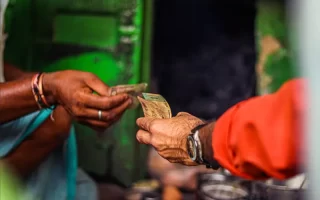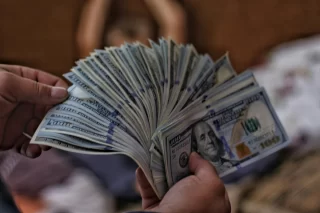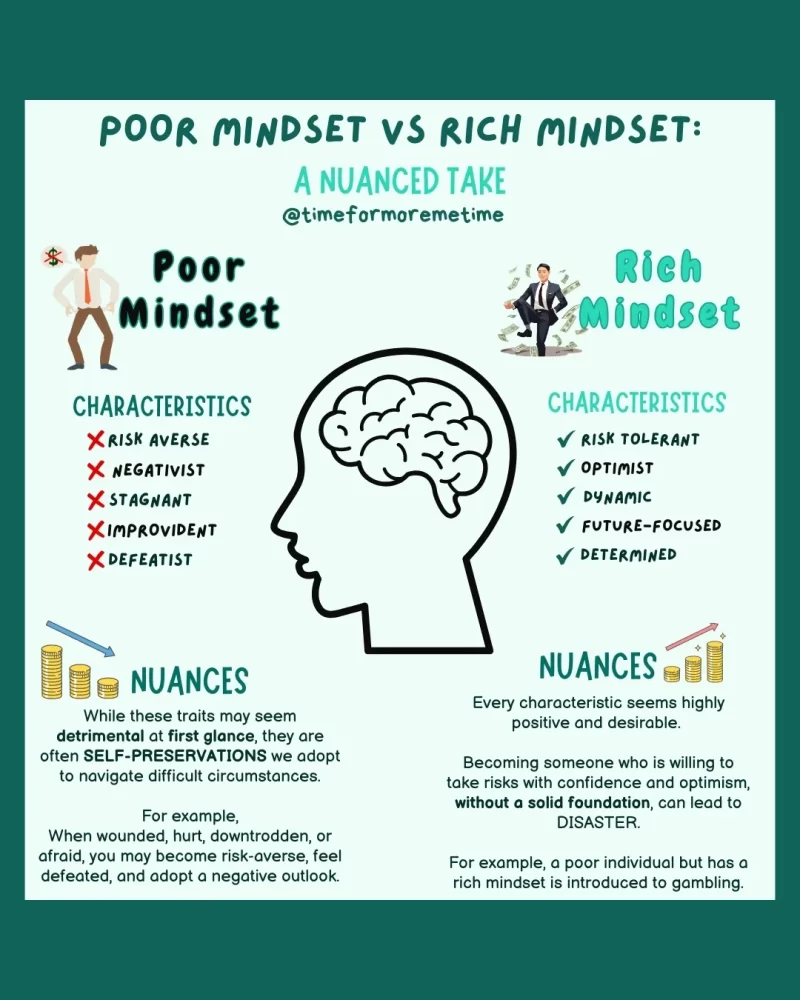
Poor mindset versus rich mindset: this has piqued my interest. With the news constantly buzzing about ‘oligarchy this, oligarchy that’—the rich against the poor and the poor feeling helpless against the rich—it seems like the perfect time to explore this topic.
This discussion was sparked by my editor, who pointed out the growing interest in this subject across various social media platforms. It’s a fascinating area to delve into, and I find myself wishing I had thought of it sooner—it truly is an intriguing topic!
As I reflect on my own life, I can’t help but remember my childhood. I grew up in a home where money was always tight—really tight, and at times, even nonexistent. I recall days when my family struggled to put food on the table, and the weight of financial stress loomed over us like a dark cloud. I often felt “dirt poor,” and in many ways, I truly was.
Now, I can confidently say that I’m part of the middle class in America. However, I wonder: since I was able to lift myself out of my situation, do I still have a poor mindset because of my past, or do I now possess a rich mindset after moving beyond poverty?
What if, during my struggles, I had tried to adopt a rich mindset? Could that have made things easier and helped me become a wealthy man? Is the rich mindset the key to success? These are the questions swirling in my mind right now.
So, I’m diving deep into research to find answers to these questions. Let’s get started and see what I uncover!
Characteristics Of A Poor Mindset
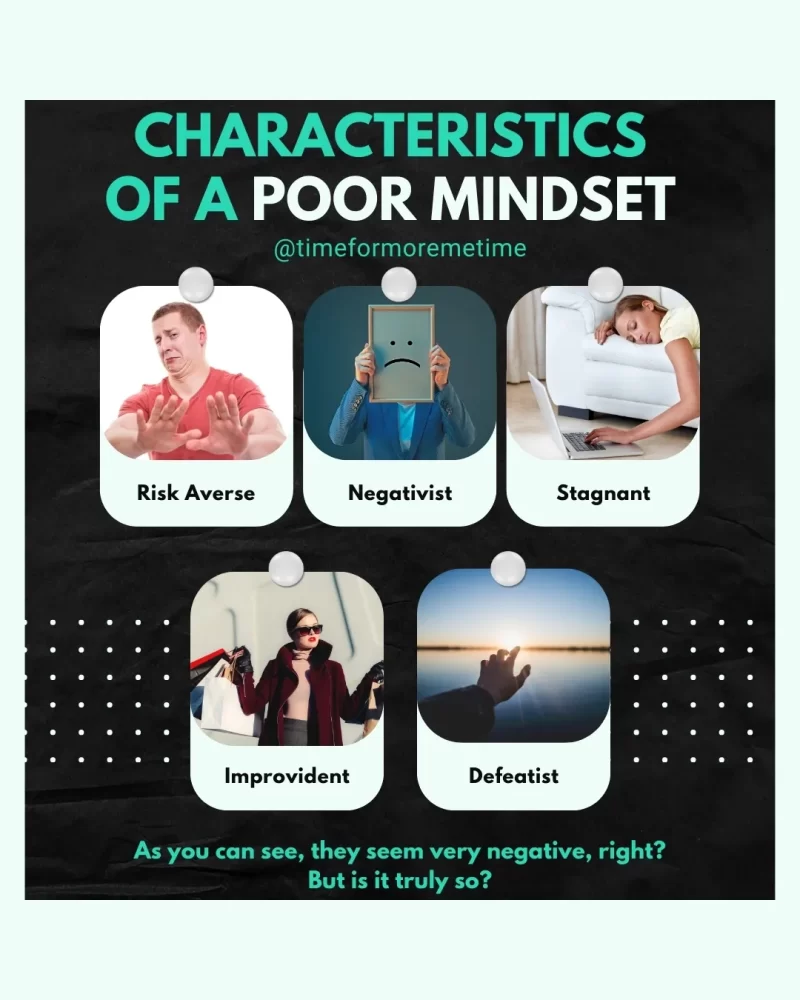
First, let’s dive into something I should be more familiar with: the poor mindset. This mindset can be summarized as one of scarcity. Depending on the context of discussion, it can be referred to the scarcity mindset or poverty mindset.
Anyway, when you’re in this mindset, you often feel that nothing is enough, and there’s a constant fear that resources will run out.
For those who are actually living in poverty, this isn’t just a mindset; it’s a harsh reality. If you truly don’t have much, it’s hard to think positively about abundance. I completely understand this perspective. However, it’s important to note that even wealthy individuals can adopt this scarcity mentality without being financially poor.
Let me outline the key characteristics of a poor mindset:
- Risk Averse: Rooted in thoughts of scarcity, people with a poor mindset are often fearful of taking risks. They seek guaranteed outcomes, especially when it comes to investments. They want to ensure they gain something from the little they have.
- Negativist: Believing they have limited resources, individuals with a poor mindset often feel like failures. They think their efforts aren’t enough and don’t meet societal standards, which can significantly lower their self-confidence.
- Stagnant: Driven by fear and self-doubt, people with a poor mindset believe they can’t change. In reality, they simply fear the unknown. Change requires investing in themselves and their situations, and because they are risk-averse, they often shy away from it.
- Improvident: With a belief that they don’t have enough, these individuals focus too much on the present. They concentrate on immediate needs and desires rather than planning for their future.
- Defeatist: With all these characteristics, they become trapped in the belief that success is out of reach. They feel they won’t be able to achieve wealth or acquire more than what they currently have.
These are the characteristics of a poor mindset. As you can see, they seem very negative, right? But is it truly so? Before I expand on that, let’s shift gears and discuss the characteristics of a rich mindset, and then I’ll provide my analysis.
Characteristics Of A Rich Mindset
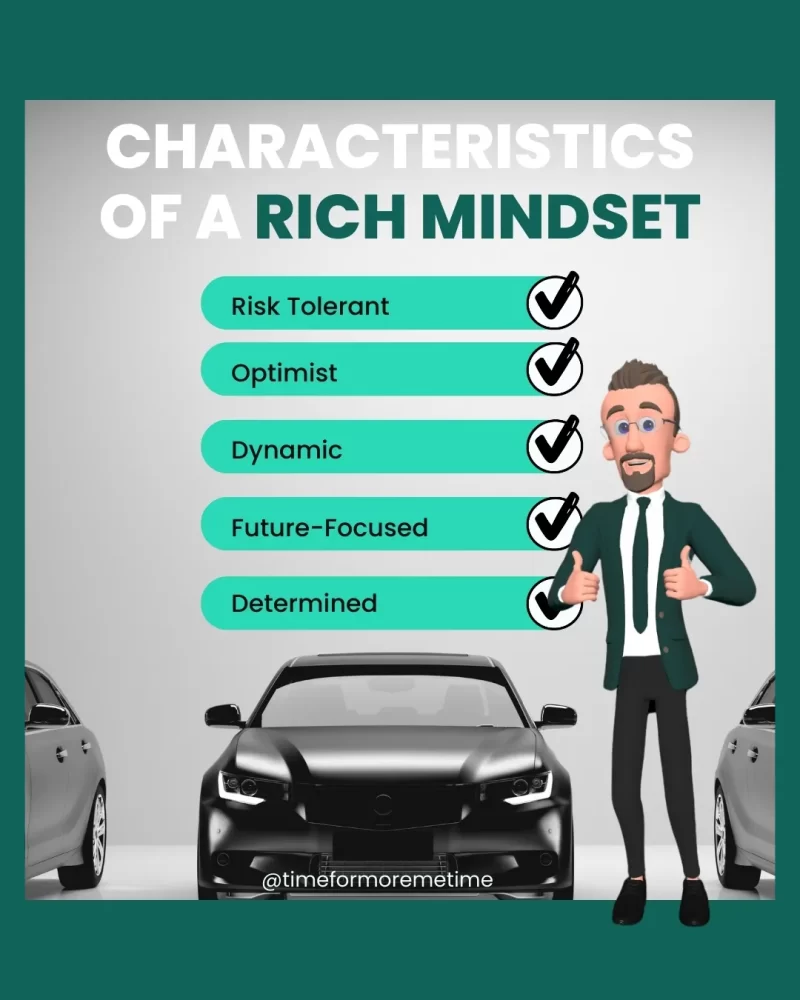
The rich mindset is essentially the polar opposite of the poor mindset. Instead of focusing on scarcity, individuals with a rich mindset concentrate on abundance. They believe that they have enough for themselves and that even more opportunities are on the way.
With that in mind, here are the key characteristics of a rich mindset:
- Risk Tolerant: People with a rich mindset are tolerant of risk. They are willing to invest in and pursue opportunities that come their way, and they actively seek out new possibilities.
- Optimist: They are not just optimistic in thought but also in action. They speak positively about themselves and others, firmly believing that their positive actions will lead to favorable outcomes.
- Dynamic: Individuals with a rich mindset are dynamic and flexible. If there’s something to gain or a positive result to be achieved, they are willing to adjust their approach without fear. They embrace learning new knowledge or skills that can benefit them.
- Future-Focused: With their positive outlook and willingness to take risks, individuals with a rich mindset tend to be more future-oriented. They focus on the potential positive results of their actions and invest in their future selves.
- Determined: They do not easily give up. Their determination drives them to pursue their goals, and they are willing to take risks and maintain an optimistic attitude in their actions. They understand that being flexible and adaptable can help them achieve what they want and provide for their future.
These are the characteristics of a rich mindset. With everything laid out, we can now proceed to the nuances of both the mindsets.
The Nuances Of A Poor Mindset
So, which mindset do you have? Are you stuck in a poor mindset, or do you embrace a rich mindset? Do the characteristics resonate with you? And how do these mindsets impact our lives?
Upon analyzing the traits of a poor mindset, I can admit that they described me when I was younger. When my brothers and I were separated from our parents because they couldn’t provide for us, I was trapped in this mindset for many years, especially during high school. I often felt down in the dumps and powerless. All I knew was that I needed to survive—doing what I could to get through each day.
Reflecting on this, I realize that the poor mindset isn’t entirely negative; it can serve as a mechanism of self-preservation. While these traits may seem detrimental at first glance, they are often mechanisms we adopt to navigate difficult circumstances.
When someone is wounded or hurt, it’s natural to feel afraid. They may become risk-averse, feel defeated, and adopt a negative outlook. They might also get stuck in the present and fear change. This response to hardship is common and often occurs as a person begins to recover from whatever hardship they face.
People who are downtrodden and poor often make safe choices that work for them. In my case, it was natural to adopt this mindset given my dire situation. I stuck to what worked to save time and money, kept my head down to focus on surviving, and took on small jobs until I could improve my circumstances.
However, if you’re not actually poor but still have a poor mindset, the story changes, and it can become a self-fulfilling prophecy.
The Nuances Of A Rich Mindset

Now, what about the rich mindset? Every characteristic seems highly positive and desirable. If you see yourself as having a poor mindset, the traits associated with a rich mindset can feel intimidating, right?
So, is there a downside to the rich mindset? Yes, there is. As I mentioned earlier, the poor mindset can be part of a state of self-preservation. People living in poverty can survive with this mindset because it allows them to focus on what’s important and what is present in front of them.
But what happens if a person in poverty suddenly adopts a rich mindset? Can they escape their situation? I believe the answer is no. Becoming someone who is willing to take risks with confidence and optimism, without a solid foundation, can lead to disaster.
Just imagine a person who is poor but has a rich mindset and is introduced to gambling. With all the characteristics of a rich mindset, that individual could easily end up in trouble.
The Verdict Between Poor Mindset Versus Rich Mindset
Things aren’t black and white. Based on what I’ve read, analyzed, and experienced, having a rich mindset alone is not key to success or escaping hardships.
From my experience, you can’t simply flip a switch and instantly adopt a rich mindset. I believe it ultimately comes down to the hard work we put in. So, how can we take advantage of this understanding?
The truth is, we people naturally shift our mindset gradually. We can’t force this mindset to succeed! Being poor with a rich mindset is a delusion that can lead to further ruin; meanwhile being rich with a poor mindset results in starting the cycle of poverty.
As a person works diligently to escape poverty, they begin to experience abundance. With this earned abundance, they become more optimistic about their future and realize that being flexible and dynamic can help them succeed. They start to cultivate hope for what lies ahead.
When abundance becomes a reality, they can take calculated risks and make investments. They become determined because they know they have the ability to succeed. The experiences they gain, the right decisions they make, and the hard work they put in all contribute to their confidence and determination.
It’s a progression; however, we must be aware. The problem is that people often get stuck in a poor mindset, feeling trapped because nothing seems to be working out for them.
They need to address each and every characteristic that the poor mindset imposes on them and work to overcome those challenges. This is not just about striving to adopt a rich mindset, but about achieving and experiencing actual abundance with their own hands.
FAQs
And let’s not forget about the FAQ section!
Can someone with a rich mindset still experience financial difficulties?
Yes, absolutely. Having a rich mindset doesn’t necessarily mean you are wealthy; it simply means you think like a wealthy person. Individuals with a rich mindset can still face financial challenges. The key difference lies in how they respond to and navigate these difficulties compared to someone with a poor mindset.
How does mindset affect decision-making?
Mindset significantly influences how individuals perceive risks and opportunities, which in turn impacts their willingness to make decisions that could lead to growth or stagnation. Essentially, mindsets can greatly affect how people manage and acquire their money.
For example, if a person with $50 is approached by a stranger who promises to return it as $100 next month, their reactions will differ based on their mindset. A person with a poor mindset might hesitate to take the risk, preferring to use the money for immediate needs. In contrast, someone with a rich mindset may consider the opportunity, weigh the potential benefits, and ultimately decide to accept it as a worthwhile investment.
Is it possible to have a mixed mindset?
Yes, individuals can exhibit traits of both mindsets depending on the context. For instance, someone might feel optimistic and confident in their career while experiencing feelings of scarcity in their personal finances.
Know that these mindsets are not solely tied to financial matters; they are a popular topic in psychology and can manifest in various aspects of life.
Conclusion
If you’re already familiar with this topic, you may have noticed that I took some liberties with the definitions. My intention was to remove the intense negative connotation often associated with the poor mindset and the overly positive view of the rich mindset. I didn’t want to follow the trend of vilifying the poor or promoting the simplistic notion that thinking rich automatically leads to wealth.
But anyway, I understand that this blog post may be different from what you typically find on this site, as it leans more toward a personal and opinion-based piece. It’s a refreshing break from the usual lists and explainers I usually write, and I hope you find it worthwhile.
If you enjoyed this type of content, please let me know! Feel free to leave a comment on my social media or follow my YouTube channel for more updates.
Thank you for taking the time to read this post! I hope you found it valuable!


